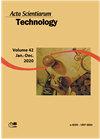紫堇质量损失脱水曲线的理化特性及建模
IF 0.6
4区 综合性期刊
Q3 MULTIDISCIPLINARY SCIENCES
引用次数: 0
摘要
可食用的花含有蛋白质、脂质、淀粉、维生素、健康饮食中重要的矿物质,以及被认为对人体健康有潜在影响的生物活性化合物。由于花的高易腐性,它们的营销代表了一个挑战,干燥是一种有助于保存产品的方法。鉴于此,本研究针对经典脱水曲线模型,通过玻尔兹曼非线性回归模型的提出,验证哪条曲线最能适应脱水过程中的质量损失,并测量堇菜花在冷冻花中的百分含量。花在30°C的空气循环烘箱中脱水至恒重。脱水后的紫薇花的百分百组成为:湿度84.69%,碳水化合物8.76%,蛋白质2.51%,粗纤维2.41%,灰分1.23%,脂肪0.40%,热量48.68 Kcal.在酚类化合物方面,冷冻和脱水后的花每克的没食子酸含量分别为423和301 mg / g,抗氧化活性分别为90.67 ~ 94.93%,对DPPH自由基(2,2-二苯基-1-苦酰水合基)的抑制作用分别为44.00和49.00 mg / g。Boltzmann模型最适合紫堇×紫堇的质量损失,通过该模型,紫堇×紫堇的最大质量损失发生在0.16 g,最大质量损失速率发生在46.7 min,其质量损失为0.66 g。脱水被证明是一种有效的保存鲜花的方法,因为在应用该过程后,生物活性化合物没有出现明显的损失。本文章由计算机程序翻译,如有差异,请以英文原文为准。
Physical-chemical characteristics and modeling of the dehydration curve for Viola x wittrockiana mass loss
The edible flowers have in their constitution proteins, lipids, starch, vitamins, important minerals for a healthy diet, as well as bioactive compounds recognized for their potential effects on human health. Due to the high perishability of the flowers, their marketing represents a challenge, and drying is a method that contributes to the preservation of the product. Given the above, the present study aims verify which is the curve that best adjusts to the mass loss during the dehydration process through the proposition of Boltzmann nonlinear regression model in face of classical dehydration curve models, as well measure in frozen flowers centesimal composition of Viola × wittrockiana flowers. The flowers were dehydrated at 30°C in an air circulation oven up to constant weight. The centesimal composition of the dehydrated Viola × wittrockiana is 84.69% humidity, 8.76% carbohydrates, 2.51% proteins, 2.41% crude fiber, 1.23% ash, 0.40% lipids and 48.68 Kcal. With respect to phenolic compounds, the frozen and dehydrated flowers showed 423 and 301 mg gallic acid equivalents per gram and, about antioxidant activity, showed 90.67 to 94.93% inhibition of the DPPH radical (2,2-Diphenyl-1-picrylhydrazyl) and 44.00 and 49.00 mg of Trolox.100 g-1. The Boltzmann model showed best fit the mass loss of Viola × wittrockiana and through this model the maximum mass loss occurs with 0.16 g, the maximum rate of mass loss of Viola × wittrockiana occurs in 46.7 min, whose mass loss is 0.66 g. The dehydration proved to be an efficient method to preserve the flowers because the bioactive compounds did not present significant losses after the application of this process.
求助全文
通过发布文献求助,成功后即可免费获取论文全文。
去求助
来源期刊

Acta Scientiarum-technology
综合性期刊-综合性期刊
CiteScore
1.40
自引率
12.50%
发文量
60
审稿时长
6-12 weeks
期刊介绍:
The journal publishes original articles in all areas of Technology, including: Engineerings, Physics, Chemistry, Mathematics, Statistics, Geosciences and Computation Sciences.
To establish the public inscription of knowledge and its preservation; To publish results of research comprising ideas and new scientific suggestions; To publicize worldwide information and knowledge produced by the scientific community; To speech the process of scientific communication in Technology.
 求助内容:
求助内容: 应助结果提醒方式:
应助结果提醒方式:


